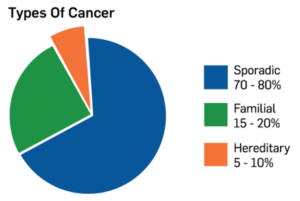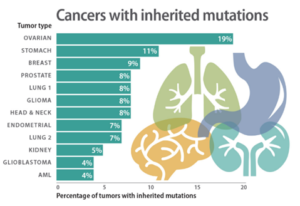Cancer can run in families due to a combination of genetic and environmental factors. When discussing cancer risk within families, two terms often come up: “hereditary cancer” and “familial cancer.” While they are related concepts, they have distinct meanings and implications. Let’s explore the difference between these two terms:
Hereditary Cancer
Hereditary cancer refers to cancer that is caused by specific inherited genetic mutations passed down from one generation to the next.
- Genetic Mutations: Hereditary cancers are linked to mutations in specific genes known as “cancer susceptibility genes.” These mutations increase the risk of developing certain types of cancer. Examples include BRCA1 and BRCA2, associated with breast and ovarian cancer, and Lynch syndrome, linked to colorectal and other cancers.
- Inheritance Pattern: These mutations are typically passed down in a predictable manner from parent to child. If a parent carries a cancer-related genetic mutation, there’s a 50% chance of passing it to each offspring.
- Early Onset: Hereditary cancers often manifest at a younger age than sporadic (non-hereditary) cancers. Individuals with hereditary cancer mutations might develop cancer earlier than the general population.
- Family History: A strong family history of a specific cancer (or cancers) is a hallmark of hereditary cancer. Multiple close relatives with the same cancer or several related cancers can indicate a hereditary predisposition.
- Genetic Testing: Genetic testing can identify the presence of these hereditary mutations. If a mutation is detected, it informs an individual’s increased risk of developing certain cancers.
Familial Cancer
Definition: Familial cancer refers to cases where a higher-than-expected number of cancers occur in a family, but there might not be a known hereditary genetic mutation causing the increased risk.
- Shared Environment: Familial cancers might be due to shared environmental or lifestyle factors within a family. These factors can contribute to a higher risk of certain cancers among family members.
- Multiple Cases: In familial cancer, multiple family members might develop the same type of cancer, but there might not be a clear inheritance pattern or known genetic mutation.
- Age and Occurrence: While familial cancers might show a clustering of cases within a family, they might not exhibit the early onset characteristic of hereditary cancers.
- Importance of Surveillance: While familial cancers might not have a single identifiable genetic cause, they still warrant increased surveillance and early detection efforts within the family.


In Summary:
In essence, the primary difference between hereditary and familial cancer lies in the presence of a known, inherited genetic mutation. Hereditary cancer is directly linked to specific genetic mutations that substantially elevate the risk of certain cancers, while familial cancer involves multiple cases of cancer within a family that might be due to shared environmental or genetic factors without a known mutation.
Both concepts emphasize the importance of family history, early detection, and proactive health management. If you suspect a hereditary or familial cancer risk in your family, seeking genetic counseling and appropriate medical guidance can provide valuable insights into your risk and guide personalized prevention and surveillance strategies.
- Watanabe T, Soeda S, Endo Y, Okabe C, Sato T, Kamo N, Ueda M, Kojima M, Furukawa S, Nishigori H, Takahashi T, Fujimori K. Rare Hereditary Gynecological Cancer Syndromes. Int J Mol Sci. 2022 Jan 29;23(3):1563. doi: 10.3390/ijms23031563. PMID: 35163487; PMCID: PMC8835983.
- Lu C, Xie M, Wendl MC, Wang J, McLellan MD, Leiserson MDM, Huang K, Wyczalkowski MA, Jayasinghe R, Banerjee T, Ning J, Tripathi P, Zhang Q, Niu B, Ye K, Schmidt HK, Fulton RS, McMichael JF, Batra P, Kandoth C, Bharadwaj M, Koboldt DC, Miller CA, Kanchi KL, Eldred JM, Larson DE, Welch JS, You M, Ozenberger BA, Govindan R, Walter MJ, Ellis MJ, Mardis ER, Graubert TA, Dipersio JF, Ley TJ, Wilson RK, Goodfellow PJ, Raphael BJ, Chen F, Johnson KJ, Parvin JD, Ding L. Patterns and functional implications of rare germline variants across 12 cancer types. Nature Communications. Dec. 22, 2015
- Li FP. Familial cancer syndromes and clusters. Curr Probl Cancer. 1990 Mar-Apr;14(2):73-114. doi: 10.1016/0147-0272(90)90008-e. PMID: 2407428.




